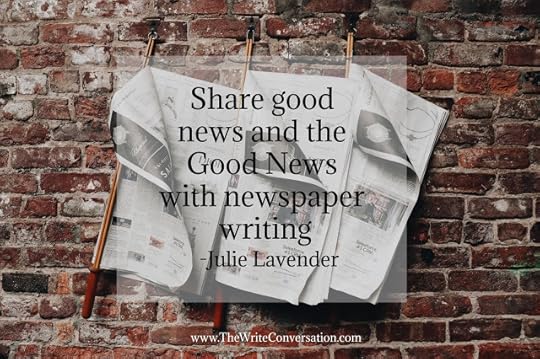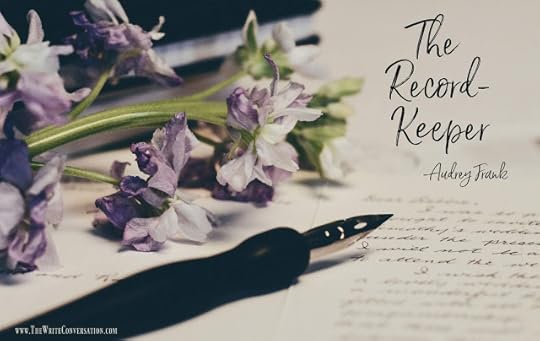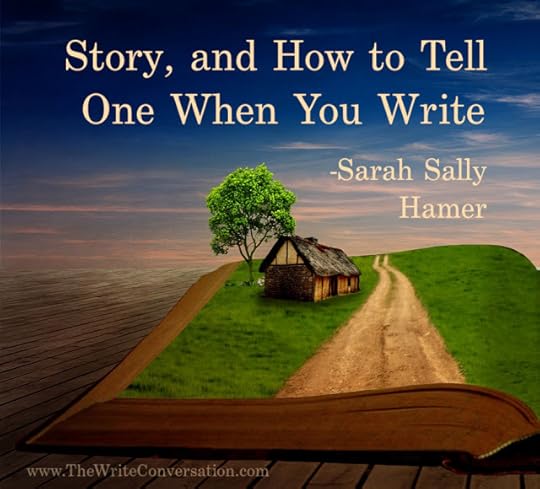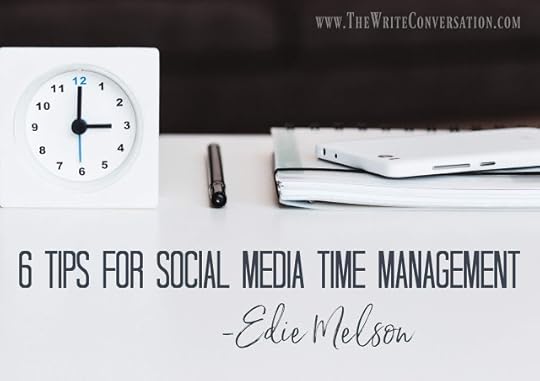Edie Melson's Blog, page 204
April 8, 2020
Share good news and the Good News with newspaper writing

by Julie Lavender @JLavenderWrites
To report the condition of our country and world in recent days, most of our newspapers scream dire and depressing headlines. And though we need that important information disseminated, good news stories and inspirational features can add a balance to otherwise difficult news to swallow.
Now’s a great time for writers to contribute encouraging articles and faith-based stories to local newspaper. The slim staff of most newspaper entities keeps busy reporting “just the facts,” and stringers can add that leverage of boots-on-the-ground, local , feel-good stories to the content. Reach out to the newspaper editor and ask if you can send him or her a story for consideration. Then, write that story about something in your community that you’ve always thought should be broadcast in the newspaper or a current event that’s taking place right now in your community circle of friends or family members.
Conduct an interview via phone call, write the article, and get it to the editor in a timely manner. Be sure to ask the person you’re interviewing if he/she can send you a picture to go along with the story, as you probably won’t be able to take a picture in person at this point with travel and shelter-in-place restrictions.
To refresh your memory, here’s some reminders about newspaper writing.
Generally speaking, the two main types of stories that you might be writing for your newspaper are: 1) news article 2) feature article.
A news article covers the who, what, when, where, and how of a current event. You might choose to write a news article that covers five local churches’ efforts to get their services broadcast online and how a church without that capability is meeting the spiritual needs of their congregation.
A feature article is typically longer and goes into more depth than just the details of a current event, news article. The feature might be covered from several angles and is written with more creativity and an entertaining bent. That doesn’t eliminate the creativity of a news article, however. But generally speaking, feature articles allow for more creativity.
Both articles begin with a lead sentence that grabs and hooks the reader right away. The news article will often get the who what, when, where, and how in that very first sentence.
For example, a news article might begin: “Friendship Baptist Church in-person services are canceled until further notice, but the church will record DVD sermons for deacons to deliver to church members upon request.”
The feature article might begin with more of a tease as to what’s to come in the next couple of sentences. Here’s an example of a feature first-sentence: “With much uncertainty and new challenges arising daily, almost hourly, amidst the ramifications of the coronavirus pandemic, school systems all across the country scrambled recently to meet the food needs of their community’s children for an extended period of time.”
The introduction of both types of articles gives the facts and figures next, usually in the first or second paragraph. Think of a newspaper article as an inverted pyramid. All the important details are mentioned at the beginning – no surprises held out for later in the article.
Sadly, many people only read the first couple of paragraphs of a newspaper article and will not finish an article in its entirety. Therefore, all the info has to be at the top. Lesser details come later in the story, which also allows for an editor to chop the end of the story, if space is a premium for the newspaper.
The second sentence of the church news article continued the introduction of the story with these words: “Without the capability to produce online services, the smaller church with a congregation of mostly seniors chose to record sermons for distribution to continue to meet the needs of their members.”
The second sentence of the feature article mentioned above continued this way: “Bulloch County Schools joined the ranks of others in that unfamiliar territory, and quickly formulated a plan to provide breakfast and lunch sack meals for students, distributing the first meals on Tuesday.” The main body of both types of stories often leads with a quote to give the reader a sense of those involved in the story.
My school bus meal delivery story continued this way: “Sabrina Fields picked up sacks of food in the Statesboro Public Library parking lot for the four kids she had in tow, ages two, five, six, and 10, who attend Langston Chapel Elementary School. Thrilled for the opportunity to take care of her kids’ meals, Fields said that the pick-up spot was convenient and easily accessed.’With everything going on around us, just trying to keep updated with the virus, it’s great not to have to focus on cooking,” said Fields. “It’s time-saving and now I can focus on my kids.’”
The church article continued this way: “’This was such a hard decision to make,’ said Pastor Tony Pagliarullo. ‘We’re working to still provide our members and regular attenders opportunities to engage and connect through worship.’ Pagliarullo urged his congregation to reach out to others when possible, with phone calls, text messages and emails.
The main body of both stories continued with other details to complete the story, and the conclusion wrapped up the story. Sometimes a quote summarizes a story succinctly and personally, too.
The news, church service article described how the members could get the DVD sermons and ended with a quote from the pastor, that said, ““In these unusual days, we know that we serve a God who is always faithful,” Pagliarullo said in an email to members. “We serve a God who is sovereign, loving, merciful and compassionate. Let us encourage each other to seek the Lord, trusting in his plans and purpose. The world is watching believers right now to see how we will continue to worship the Lord, trust the Lord and make disciples even during these unprecedented days. May we be faithful.”
The meal delivery service for students contained heartfelt quotes from fearful and anxious parents collecting food, described how the food was being prepared and distributed, and included quotes from a Board of Education employee.
The story ended with these two paragraphs: “The virus was rarely mentioned in the brief meal pick-up by families, though some adults spoke of the uncertainty of the situation. All appeared grateful, with signs of relief and appreciation evident on most faces.
‘We’ve seen a lot of smiles today,’ Brown said.”
Have you thought about contributing news stories and features to your local newspaper? Now is a great time to check out that market and add valuable writing credits to your resume with published newspaper story. The world needs the good news and Good News that you just might have the opportunity to share!
TWEETABLEShare good news and the Good News with newspaper writing - @JLavenderWrites on @EdieMelson (Click to Tweet)
 Julie Lavender is a journalist, author, and former homeschooling mom of twenty-five years who holds a Masters Degree in Early Childhood Education. Julie is married to her high-school and college sweetheart, and Julie and David are the parents of four, in-law of one, and grandparents to a sweet, fourteen-month-old grandson. Julie loved living in various locations across the country as the wife of a medical entomologist for the United States Navy. After her husband retired from active duty, the family moved back to their hometown, and David began work as a wildlife biologist at a nearby Army installation.
Julie Lavender is a journalist, author, and former homeschooling mom of twenty-five years who holds a Masters Degree in Early Childhood Education. Julie is married to her high-school and college sweetheart, and Julie and David are the parents of four, in-law of one, and grandparents to a sweet, fourteen-month-old grandson. Julie loved living in various locations across the country as the wife of a medical entomologist for the United States Navy. After her husband retired from active duty, the family moved back to their hometown, and David began work as a wildlife biologist at a nearby Army installation.Julie is excited that her parenting book, 365 Ways to Love Your Child: Turning Little Moments into Lasting Memories, published by Revell, releases in October of this year. Julie’s newspaper contributions number over 900 news articles, features, columns, and more, and she loves sharing good news and the Good News in her newspaper, the Statesboro Herald. She would love for you to connect with her on social media and chat about newspaper writing.
Published on April 08, 2020 22:00
April 7, 2020
Another Way to Look At "Viral" Writing

by Linda Gilden @LindaGilden
Many of us create Facebook posts and You Tube segments hoping they will go viral. But I’d like to make a few suggestions for viral writing defined as writing that continues during social distancing because of a virus.We have to be creative during these unusual times. Yes, writers can write from anywhere. Because we can continue writing, we have a tremendous responsibility to bring hope to those who are at home reading. During these last weeks we have had to become creative about what we produce, but God has prepared Christian writers to spread hope to others. Here are a few suggestions for 2020 viral writing.1. Meet all your deadlines, or better yet, be early. Not only will that please your editor but it will clear your plate to move on to another project.2. Start that book or article you have always wanted to write but never had time. Schedule an hour or two every morning and only work on a new project.3. Use an online platform to start a new writers group or set your current one up to function on line. It’s amazing how much you can glean from an online group. Not quite the same as being in the same room but it does give us face-to-face contact and a feeling of being together.4. Use your writing to keep your family close. Here are a few examples.Write a letter to your parents to let them know how much you appreciate them. If they are in a nursing home or retirement facility they will love getting extra mail.Mail a cute card to each of your grandchildren.Start writing a story with your grandchildren, taking turns writing scenes.Email a joke to your grandchildren first thing every morning. Only send the question. Leave the punch line for them to guess.Think of someone who has been an encouragement to you in your writing or some other way and send them a handwritten thank you.Check your church shut-in list and write cards to those who live alone.5. Other ways to keep your family close might include drive-by grandparent visits if you live in town. You can sit in the car and watch the children play in the yard or with neighborhood friends. Or create a family online conference call. You can see each other clearly and exchange news of what is going on. This works well, especially if you live in different cities.
Whatever you are doing with your unexpected time at home, it most probably includes some kind of writing. And, as you do your viral writing, don’t forget to pray for those on the front line of the global virus that is unlike anything our generation has ever seen.
TWEETABLEAnother Way to Look at "Viral" Writing - @LindaGilden on @EdieMelson (Click to Tweet)
 Linda Gilden is an award-winning writer, speaker, editor, certified writing and speaking coach, and personality consultant. Linda is the author of 19 books and over 1000 magazine articles. She enjoys every meeting with editors and knowing we are all part of the same team. Linda’s favorite activity (other than eating folded potato chips) is floating in a pool with a good book surrounded by splashing grandchildren—a great source of writing material! www.lindagilden.com
Linda Gilden is an award-winning writer, speaker, editor, certified writing and speaking coach, and personality consultant. Linda is the author of 19 books and over 1000 magazine articles. She enjoys every meeting with editors and knowing we are all part of the same team. Linda’s favorite activity (other than eating folded potato chips) is floating in a pool with a good book surrounded by splashing grandchildren—a great source of writing material! www.lindagilden.com
Published on April 07, 2020 22:00
April 6, 2020
Write Well In Spite Of

by PeggySue Wells @PeggySueWells
Writing comedy and suspense, Rene Gutteridge is the author of 24 novels, including Misery Loves Company, Possession, Listen, Never the Bride, The Occupational Hazards Series, The Storm Series, The Boo Series, My Life as a Doormat and the novelization of The Ultimate Gift. She writes screenplays and her books have been made into Hallmark movies.
She recalls the memorable career advice she received.The best piece of writing advice came as advice for something else. I was at a writers retreat. In the wee hours of the night, I sat in my hotel room discussing with a beloved and godly writer friend the difficulty of relationships. We were laughing and crying together.
“Rene, remember:” she said, “love well, in spite of.”
That phrase has carried me through hard times, and I have applied it in my writing.
Write well, in spite of. Write well, in spite of my doubts.Write well, in spite of the odds. Write well, in spite of the unknown. Write well, in spite of hardship, fear, discouragement, disappointment, criticism, pain.
I’ve also come to understand the deep significance of loving well my fellow writers. In a competitive industry full of fiery arrows, to love and be loved by those whose journey you understand is invaluable. One friend is like a spiritual microscope. My writing world can get fuzzy. With anointed words of wisdom, he is able to bring everything into sharp focus. Another writer friend is my champion. Another is my confidant.
I remember leaving my city on a plane for a writers retreat and thinking with great relief, “I can’t wait to get there, to where all the normal people are.”
I laughed out loud at my thoughts. Nobody else on earth would consider writers normal. But that is where the beauty is, to be understood. There is nothing like friendship with a fellow writer.
There are a vast number of things that can steer us toward not writing well. Not loving well. By God’s power, we can rise above it all, be blessed, and be a blessing.
TWEETABLEWrite Well in Spite Of - @PeggySueWells on @EdieMelson (Click to Tweet)
 Tropical island votary and history buff, PeggySue Wells parasails, skydives, snorkels, scuba dives, and has taken (but not passed) pilot training. Writing from the 100-Acre wood in Indiana, Wells is the bestselling author of twenty-eight books including The Slave Across the Street, Slavery in the Land of the Free, Bonding With Your Child Through Boundaries, Homeless for the Holidays, and Chasing Sunrise. Optimistic dream-driver, PeggySue is named for the Buddy Holly song with the great drumbeat. At school author visits, she teaches students the secrets to writing, and speaks at events and conferences. Connect with her at www.PeggySueWells.com, on Facebook at PeggySue Wells, and Twitter @PeggySueWells.
Tropical island votary and history buff, PeggySue Wells parasails, skydives, snorkels, scuba dives, and has taken (but not passed) pilot training. Writing from the 100-Acre wood in Indiana, Wells is the bestselling author of twenty-eight books including The Slave Across the Street, Slavery in the Land of the Free, Bonding With Your Child Through Boundaries, Homeless for the Holidays, and Chasing Sunrise. Optimistic dream-driver, PeggySue is named for the Buddy Holly song with the great drumbeat. At school author visits, she teaches students the secrets to writing, and speaks at events and conferences. Connect with her at www.PeggySueWells.com, on Facebook at PeggySue Wells, and Twitter @PeggySueWells.
Published on April 06, 2020 22:00
April 5, 2020
Sometimes You Really Can’t - 6 Tips to Help Writers Embrace the Now

by Ralene Burke @RaleneB
Over the last few weeks, a wide variety of emails and blog posts crossed my line of sight. Lots of well wishes, encouragement to push through, ways to overcome, etc. I’ve even been the creator of some of those emails and social media posts. But the truth is—sometimes you really can’t.
Now don’t get me wrong…we should be doing our best to push through and overcome the obstacles in our way. God gives us the strength and fortitude to do so. However, there are times when things are SO overwhelming that we freeze up—mentally and/or physically—and our guilt at not overcoming increases minute by minute.So what do we DO in times like this? Whether it’s in the middle of COVID-19 chaos or after the death of a loved one or whatever our worst-case scenario might be, what do we do when we really can’t push through?
Embracing the NowFirst, we acknowledge our situation and the emotions that come with it. Despite what some might say, it’s perfectly okay to be afraid or angry or worried. We’re human, even if we are Christian. Ignoring the emotions can keep us from overcoming them, from taking the next right steps.Then we give ourselves grace. LOTS of grace. When we face big changes in our lives, things are bound to be difficult for a while. We won’t always get it right the first time, or the second—there is no time limit for facing our situation and making things feel normal again. We’ll have bad days. We’ll make bad decisions. But we serve a God whose mercies are new every morning…and we should follow suit in how we view ourselves.PRAY. All the time. In every moment. There is nothing stronger than prayer. No release better than prayer. And no time better spent than with the Lord. I would even say spending extra time reading the Bible or in study would help the peace and understanding to spread in our hearts.Find a way to release stress. Some of us need to be physical, some of us work out our feelings when we talk to someone, some of us fall into the arts. Whatever our choice stress reducer, we need to make time for that!When we come to a place, mentally, where we can embrace the now, we take the next right step. We all know the adage with the question, “How do you eat an elephant?” One bite at a time. Instead of worrying about what’s coming up tomorrow or next week or next month, maybe we just face the now. What needs to be done now? Who needs our attention now? What do I need now?Focus on something other than ourselves. Sometimes, we stay locked in our heads because we are so fixated on OUR circumstances that we become obsessed. If we take the time focus on other things, other people, we not only find ways to help others, but we allow our subconscious to work through our worries and fears in a much healthier way. (The same goes with getting a full night’s sleep!)
Once we come to that good menta place, we can finally push through and overcome our circumstances. These adjustments don’t happen overnight, and we are doing ourselves—as well as those around us—a disservice when we try to force happy faces and false encouragement. Sometimes we really can’t move on right away.
It’s okay to take the time to adjust. It’s okay to work through our emotions. Just don’t stay stuck in those dark places. Find the light!
Are you finding more time to write in spite of what the world is going through?
TWEETABLESometimes You Really Can’t: 6 Tips to Help Writers Embrace the Now - @RaleneB on @EdieMelson (Click to Tweet)
 Whether she’s wielding a fantasy writer’s pen, a social media wand, or a freelance editor’s sword, Ralene Burke always has her head in some dreamer’s world. And her goal is to help everyone #SHINE Beyond their circumstances! Her novels, Bellanok and Armor of Aletheia, are available on Amazon. More fantasy novels coming soon!
Whether she’s wielding a fantasy writer’s pen, a social media wand, or a freelance editor’s sword, Ralene Burke always has her head in some dreamer’s world. And her goal is to help everyone #SHINE Beyond their circumstances! Her novels, Bellanok and Armor of Aletheia, are available on Amazon. More fantasy novels coming soon!When her head’s not in the publishing world, she is wife to a veteran and homeschooling mama to their three kids. Her Pinterest board would have you believe she is a master chef, excellent seamstress, and all-around crafty diva. If she only had the time . . . You can also find her on Facebook, Instagram, Twitter, or at her website.
Published on April 05, 2020 22:00
April 4, 2020
The Record-Keeper

by Audrey Frank @AudreyCFrank
A record of the genealogy of Jesus Christ the son of David, the son of Abraham… Matthew 1:1
Matthew was a record-keeper. A former tax collector, he was a professional recorder of numbers and facts. He was a detail-keeper and fact-protector. It was this career record-keeper, sitting at his tax booth, that Jesus walked right up to and said the life-changing words, “Follow me” (see Matthew 9:9). Matthew immediately got up and followed Jesus. His old profession was instantly infused with new purpose. Matthew the record-keeper would be a key eyewitness to much of Jesus’ earthly ministry. And he would faithfully record everything he saw.
The name Matthew means “Gift of Yahweh.” Matthew, the author of the gospel that carries his name, is a gift from God to writers. He has much to teach us.Profession RepurposedMany writers did not begin as writers. They began as nurses, secretaries, and engineers. Soccer coaches and chefs. Accountants and photographers. An encounter with Jesus changed their lives and repurposed their professions. Now, they follow the Savior and wield the words He gives.
Some potential writers are sitting in their tax booths wondering if all their record-keeping makes any difference in the hurting world around them. To those I would say, be watchful. Jesus is drawing near. Look up! He repurposes our work and gives our lives new meaning. After meeting Jesus Matthew stopped collecting taxes, but he never stopped record-keeping. His skills were employed by the King of kings so you and I would know the Gospel today. Matthew’s temporal work was transformed into lasting work that will be remembered for eternity. This is the purpose we all long for in our life’s work. Lasting, world-changing work imbued with value.
Jesus never wastes our professions; He repurposes them. The work Jesus calls us to do as writers is work that will remain long after we lay down our pens.
Eyewitness RecorderMatthew became an eye-witness of Jesus’ life and ministry the moment Jesus drew near to him. He also would become one of the original twelve Apostles. As an eyewitness, Matthew recorded all he observed. Facts were important to him, and the preservation of those facts was paramount in his value system. There is even evidence that he wrote one copy of the gospel of Matthew in Hebrew and one in Greek to ensure its veracity and accessibility to as many people as possible.
Matthew the record-keeper also carefully compiled a genealogy of Jesus. In my own life, I have seen Matthew’s genealogy form the bedrock of proof for many Muslims examining Christ’s claims to be God. Knowing one’s pedigree is of utmost importance in honor-shame societies such as Muslim-majority cultures. Matthew’s record has been the convincing factor in many of my Muslim friends’ journeys to faith in Jesus as the Messiah.
Matthew included ten parables and three miracles not mentioned in the other gospels of Mark, Luke, and John. Additionally, he alone records the sealing of Jesus’ tomb and the posting of the Roman guards outside it.
As a record-keeper, Matthew was vigilant and faithful to write down for us all he saw. Because of his faithfulness to use the gifts he was given, our faith today is stronger.
At our time in history, the world is at a standstill because of a virus we cannot even see. The Coronavirus has immobilized societies around the globe. As writers, we can record what we see Jesus doing amid this crisis. We can use the gifts we have been given to make a record of God’s faithfulness, his steadfastness, the work of the Lord that may seem a small occurrence in the moment but may bring faith to millions in the eras to come.
Like Matthew, we have the privilege of being eyewitness recorders of Jesus’ ministry in our world today. The world needs our testimony, our faithful obedience to write what we see. With our pens and keyboards, we become emissaries of hope and faith.
King ProclaimerMatthew proclaimed Jesus as the long-awaited King and His followers as citizens of a heavenly realm. He records Jesus’ public parables of the kingdom of heaven and His private explanation of them to his disciples. This emphasis in the gospel of Matthew reminds us that even when the world is in an uproar, those who follow Christ have citizenship in a higher, heavenly realm. We can set our hearts on heaven despite our earthly circumstances.
This is a sorely needed message in any era.
Matthew teaches us that as writers, we can offer hope to a world in upheaval by reminding them there is another country, a heavenly one, and it is accessible to all who will place their trust in the Messiah Jesus. He is the long-awaited King of kings and Lord of lords. His reign and rule are justice and peace.
Writers can be King-proclaimers, pointing readers to the reality of citizenship in heaven.
What will you record today? Take up your pen and continue to write. Matthew had no social media, no world-wide-web. He followed Jesus, he recorded what he saw, and he gave readers hope that has lasted through all the ages. We can all do that.
Lord, I will follow You. I will record what I see. I will share Your wondrous works with the world. Amen.
TWEETABLEThe Record-Keeper - insight and encouragement from @AudreyCFrank on @EdieMelson (Click to Tweet)
 Audrey Frank is an author, speaker, and storyteller. The stories she shares are brave and true. They give voice to those whose words are silenced by shame, the hard things in life that don’t make sense, and the losses that leave us wondering if we will survive. Audrey and her family have spent over twenty years living and working among different cultures and world views, and she has found that God’s story of redemption spans every geography and culture. He is the God of
Instead
, giving honor instead of shame, gladness instead of mourning, hope instead of despair. Although she has three different degrees in communication and intercultural studies, Audrey’s greatest credential is that she is known and loved by the One who made her.
Audrey Frank is an author, speaker, and storyteller. The stories she shares are brave and true. They give voice to those whose words are silenced by shame, the hard things in life that don’t make sense, and the losses that leave us wondering if we will survive. Audrey and her family have spent over twenty years living and working among different cultures and world views, and she has found that God’s story of redemption spans every geography and culture. He is the God of
Instead
, giving honor instead of shame, gladness instead of mourning, hope instead of despair. Although she has three different degrees in communication and intercultural studies, Audrey’s greatest credential is that she is known and loved by the One who made her.Audrey is the author of Covered Glory: The Face of Honor and Shame in the Muslim World (Harvest House Publishers), an outpouring of Audrey’s heart to introduce others to the God of Instead. Shame is not unique to the developing world, the plight of the women behind veils, young girls trafficked across borders; shame is lurking in hearts everywhere. Through powerful stories from women around the world, Covered Glory illuminates the power of the Gospel to remove shame, giving honor instead. Available at favorite booksellers: Barnes & Noble , Books A Million, Amazon.
You can also find Audrey at www.audreyfrank.com, as well as on Twitter and Facebook
Published on April 04, 2020 22:00
April 3, 2020
Weapons for Fearful Times

by Tim Suddeth @TimSuddeth
On March 16, 2020, President Trump appeared on our televisions to announce his 15 Days to Slow the Spread. And each of our worlds took on a science fiction tint.
All of our plans and routines slammed into a cliff called COVID-19. Social distancing, frequent hand washing, and staying inside became part of our new normal. Home schooling our kids became mandatory. Going to a movie, a restaurant, or even the park became a dream. And watching the news took on even greater importance to get a glimpse of what our future as a nation and a community might hold.And no one right now can tell us how long this will last. When this will get back to something like normal. We’re all stuck in limbo.
For many of us, when circumstances get tough, we have two escapes: sports and work. Sports were taken away when they cancelled the games of all the major sports. At work, we either faced closed doors or our job duties were drastically changed.
And all this happened within just a couple of days, if not hours.
Unprecedented. An attack by an invisible enemy. Terms like these spin around us as we find ourselves in a surreal world.
When our routines and circumstances are upended like this, fear and anxiety usually aren’t far away, maybe even expected. Let’s face it, if we wanted to have a pity party today, we would have a lot of company.
But, (This is a really good place for a but, right?) God hasn’t gone anywhere. Everything else in the world may have changed, this virus has touched at least 150 nations, but He isn’t overcome by fear or worry. And He doesn’t want His children to be overcome by them either.
God has not given us a spirit of fear, but of power and of love and of a sound mind. 2 Timothy 1:7
I always get nervous when we talk about this verse. It reminds me where we are told in the Bible to “be anxious for nothing”. And I know I can’t do that. I know God is bigger than any circumstance but a mouse in the middle of the night will still keep me from sleeping the rest of the night. And this virus is bigger than any mouse.
Well, technically, I guess not, but work with me here.
But God didn’t leave us without options, weapons if you will. Instead of a fearful spirit, what did he give us?
Weapons to Fight Fear
1) PowerThankfully, His power, not mine. I can’t spell pandemic without spell check. When Paul wrote this to Timothy, He couldn’t help him either. He was in Roman staying in Caesar’s special motel, a prison. He had to ask friends to bring him a cloak and his books.
But Paul didn’t see his circumstances as a sign of weakness or failure. Jesus had told him that He had a plan. I’m sure Paul had his doubts and wondered why God chose prison, beatings, and betrayals to spread His gospel—couldn’t He have just started the internet—but Paul knew God was in control during His plan.
The same is true today. We are going to be called to go through different hardships and fears, but God has promised to stay with us. In fact, He gave us His word.
2) LoveOne thing I’ve learned about fear, it usually turns my focus inward on me: my troubles and my circumstances. However, when I look outward or upward, fear loses its power.
Look outward to others. What is often the difference in the hero who runs toward the trouble, the burning house, the overturned car; and the person who runs away? The person we call a hero sees someone in need and goes to help. The other person sees danger and runs away.
Love doesn’t mean you have to endanger yourself, but it does mean you look at others as much as yourself. When you do, when you think of we instead of I, that we are all in this together, then it’s easier to put the threat in its proper perspective.
Look upward to God. I’m not supposed to have all the answers or depend only on my strength. When I look at the allmighty, eternal, creator God we serve, I know I can trust Him with any concerns I may have.
3) Sound Mind Some versions have this as self-control. We are living in a fearful time. We seek information but doubt whatever we hear. It seems that everyone has an agenda.
Not only is it hard to trust others, the known facts seem to be constantly changing. Since this is a new virus, the scientists are still learning about it. And since we get most of our news on social media, it has been hard to keep up. Is what I’m reading the latest news or an older post? Even a day, sometimes made a difference.
We are also seeing so many scams and false information being spread. Iran has had hundreds to die because they were told that drinking alcohol would kill the virus.
But God gave us a mind. With it, he expects us to judge what we hear or read. Does it sound real? Does it apply to your circumstance?
And before we say, text or post anything, put it through the Philippians 4:8 test. Is it true? Is it honorable? Will it help others? Is it loving? If not, you probably should keep it to yourself.
This is a scary time, but that doesn’t mean that we should close the blinds, sit in the corner, and tremble. We’ve been through fearful times before. And a lot of you have more than the virus and its consequences to face. Cancer, bills, friends or family who seem to be straying are still with us.
But God. When the whole world and everyone in it seems to tremble like an earthquake, just go back to those two words.
TWEETABLE Weapons for Fearful Times - @TimSuddeth on @EdieMelson (Click to Tweet)
 Tim Suddeth is a stay-at-home dad and butler for his wonderful, adult son with autism. He has written numerous blogs posts, short stories, and three novels waiting for publication. He is a frequent attendee at writers’ conferences, including the Blue Ridge Mountain Christian Writers Conference and a member of Word Weavers and ACFW. He lives near Greenville, SC where he shares a house with a bossy Shorky and three too-curious Persians. You can find him on Facebook, Twitter, or at timingreenville.com.
Tim Suddeth is a stay-at-home dad and butler for his wonderful, adult son with autism. He has written numerous blogs posts, short stories, and three novels waiting for publication. He is a frequent attendee at writers’ conferences, including the Blue Ridge Mountain Christian Writers Conference and a member of Word Weavers and ACFW. He lives near Greenville, SC where he shares a house with a bossy Shorky and three too-curious Persians. You can find him on Facebook, Twitter, or at timingreenville.com.
Published on April 03, 2020 22:00
April 2, 2020
Tap Into the Power of Creative Joy

by Edie Melson @EdieMelson
For the first two weeks of this pandemic, I was interested in all the posts that offered tips about writing during this difficult times. I’ve written and published several here on this site. They’re an important part of processing what we’re going through.
But if I read too many of them, they get to be a little bit overwhelming.
So I’m taking a step back from all the options and coping skills and embracing joy…Creative joy.
That’s what fuels my soul. And I suspect that’s what fuels yours as well.
So today I’m issuing a challenge. I’m you all to join me in the practice of keeping a joy journal. You can use any means you choose—NotebookJournalLoose leaf paper in a three ring binder
Just pick a means that feeds your joy, and does NOT add to your stress.
Many of you know that I’m an advocate of journaling in general and bullet journaling specifically. I also regularly include a gratitude journal layout for every month in my planner. But a Joy Journal is slightly different than a gratitude journal.
What is a Joy Journal?Keeping a joy journal is the practice of recording things that bring you joy. Yes, it can be something you’re grateful for, but it’s broader than that. Here are some ideas to get you started:Cover a page with different shades of a color that bring you joy (for me that would be robin’s egg blue).Pick up beautiful feather while you’re outside and you tape to the page. Write out a quote that makes you smile.Compose a poem.Write a Bible verse.Write out a prayer.Snap a picture with your phone and print it out. If you don’t have access to a printer, describe the scene.
Now go one step further. We’re all writers here, so the next thing I'm asking you to do is to describe how you’re feeling and why this particular thing/experience/thought brings you joy.
The important thing to remember is that this joy journal is for you . It brings you joy. Unless you want to share, no one else will see this. And you’re not allowed to say horrible things to yourself while you’re creating it. Things like these are not allowed:This is stupid.I can’t draw.I’m not doing this right.If anyone saw this they’d laugh.
Writers are creatives. We’re also husbands, wives, fathers, mothers, sons and daughters. And during this crisis, so many of us have a heightened sense of the need to be responsible and care for those around us.
But I’ve discovered I can’t pour water from an empty vessel.
Stress will eat us from the inside out if we don’t feed our souls.
That means taking a little time to remember the joy. For me, that joy begins and ends with the blessings God puts all around me. The trick is concentrating on that for a little while each day. When I do that, the strength I need is there—along with an indescribable peace.
I’d love to know who’s with me on this challenge? Post a comment below and lets encourage each other to creative joy!
Don’t forget to join the conversation,Blessings, Edie
TWEETABLETap Into the Power of Creative Joy - @EdieMelson (Click to Tweet)
 Edie Melson is a woman of faith with ink-stained fingers observing life through the lens of her camera. No matter whether she’s talking to writers, entrepreneurs, or readers, her first advice is always “Find your voice, live your story.” As an author, blogger, and speaker she’s encouraged and challenged audiences across the country and around the world. Her numerous books reflect her passion to help others develop the strength of their God-given gifts and apply them to their lives.Connect with her on her website, through Facebook, Twitter and on Instagram.
Edie Melson is a woman of faith with ink-stained fingers observing life through the lens of her camera. No matter whether she’s talking to writers, entrepreneurs, or readers, her first advice is always “Find your voice, live your story.” As an author, blogger, and speaker she’s encouraged and challenged audiences across the country and around the world. Her numerous books reflect her passion to help others develop the strength of their God-given gifts and apply them to their lives.Connect with her on her website, through Facebook, Twitter and on Instagram.
Published on April 02, 2020 22:00
April 1, 2020
Quarantine Writing Rules

by Lynn H. Blackburn @LynnHBlackburn
How’s everybody doing?
If you’re rocking this quarantine life, then I want you to know that I’m happy for you. I really am.
But in case you aren’t, can I offer a few words of encouragement today?
These are my personal Rules to Quarantine, that I just made up because let’s face it, none of us have ever done this before and we have no idea what we’re doing. But I like rules. They make me feel like I have control, when, obviously, I don’t. Maybe you can relate? Rule #1 - Do NOT, under any circumstances, compare yourself to your neighbor, sibling, coworker, or fellow author. No one, absolutely no one, is experiencing life exactly the way you are right now. No one has the exact same mix of responsibilities, opportunities, obligations, or disappointments that you have, so don’t fall into the trap of thinking that you’re doing this wrong.
You may be figuring out e-learning with your kids, or trying to figure out how to communicate with a parent in assisted living. You may be working more hours than you’ve ever worked in your life, or you may have been laid off and are wondering how to pay the bills. Very few of us are doing life exactly the way we were a month ago and there’s no quarantine checklist to let us know how to do this.
FUN FACT: NO ONE KNOWS WHAT THEY ARE DOING. Not really. Even the ones who act like they do, don’t. We are all winging it. Do your best and let the rest of it go. Some days your best might be weeding the garden or painting a bedroom or cleaning out closet. Some days your best might be binge-watching Netflix. Either way, don’t compare your quarantine approach to the way anybody else does it. Pray and ask God to show you how He wants you to respond and trust that He will give you the grace to do it, and not worry about what everyone else is prioritizing.
Rule #2 - Do NOT, under any circumstances, expect to accomplish more than you normally do during the days and weeks ahead. But Lynn, you say, I’m home all the time now. I *should* be able to finish this manuscript by the time this is all over. Look, I know you’ve seen the meme about how Shakespeare wrote King Lear and Newton came up with the theory of gravity while they were quarantined, but that does not mean you have to.
I am the worst at this. I tend to value myself and determine my worth by how much I accomplish, but now is not the time. This is not necessarily an opportunity for me to crush my goals. This may be an opportunity for me to fill my creative well to the brim so when the time comes, I can pour it out into whatever task God sets before me.
FUN FACT: GOD DOES NOT CARE ABOUT YOUR PRODUCTIVITY—HE CARES ABOUT YOUR HEART. Is it possible that God will give you the motivation and desire to create during this time? Absolutely. And if you’re creating with Him, then by all means, create! But it’s also possible that what God wants out of this time is for His people to remember what it looks like to find total satisfaction in Him and Him alone. Imagine the art and creativity that would come from people who, when this is over, have no greater desire than to please God!
Rule #3 - Do NOT, under any circumstances, forget that your art matters. Sometimes, it’s easy for me to fall into the trap of thinking that what I do doesn’t really matter. I love books and words and I love to read and write, but in the grand scheme of things, is it really important? I know it’s important to me, but sometimes I wonder if it’s making a difference. If this time teaches us nothing else, we should never, ever wonder about that again.
For myself, I’m finding unabashed delight in the art that’s being tossed around like confetti. Patrick Stewart is reading sonnets. Andrew Lloyd Webber is playing the piano. Garth Brooks and Trisha Yearwood are having concerts. Michael W. Smith is leading worship. Mo Willems is giving art classes. Jimmy Fallon is doing The Tonight Show from his house with graphics drawn by his darling daughters. There’s nothing fancy about any of it. It’s simple. It’s lovely. It’s creative. It’s artists sharing their art with the world, and guess what? We’re eating it up. We can’t get enough. Why? Because art matters. It has always mattered, but now when so much has been canceled, we’ve discovered it all over again.
FUN FACT: WE DON’T NEED STADIUMS OR CROWDS TO CREATE. Don’t ever let the size of your audience determine whether or not you’re going to create what God has called you to create. Don’t ever think that the hard work you’re putting in today won’t pay off in the long run. If you’re an artist, the world needs you and the unique art that only you can bring to life. Don’t forget that.
I rarely close these posts with a prayer, but it seems appropriate for this time. I’m borrowing this one from the Apostle Paul….
For this reason I bow my knees before the Father, from whom every family in heaven and on earth is named, that according to the riches of his glory he may grant you to be strengthened with power through his Spirit in your inner being, so that Christ may dwell in your hearts through faith—that you, being rooted and grounded in love, may have strength to comprehend with all the saints what is the breadth and length and height and depth, and to know the love of Christ that surpasses knowledge, that you may be filled with all the fullness of God.
Now to him who is able to do far more abundantly than all that we ask or think, according to the power at work within us, to him be glory in the church and in Christ Jesus throughout all generations, forever and ever. Amen.
TWEETABLEQuarantine Writing Rules - @LynnHBlackburn on @EdieMelson (Click to Tweet)
 Lynn H. Blackburn loves writing suspense because her childhood fantasy was to become a spy—but her grown-up reality is that she's a huge chicken and would have been caught on her first mission. She prefers to live vicariously through her characters and loves putting them into all kinds of terrifying situations—while she's sitting at home safe and sound in her pajamas!
Lynn H. Blackburn loves writing suspense because her childhood fantasy was to become a spy—but her grown-up reality is that she's a huge chicken and would have been caught on her first mission. She prefers to live vicariously through her characters and loves putting them into all kinds of terrifying situations—while she's sitting at home safe and sound in her pajamas! Her Dive Team Investigations series kicked off in 2018 with Beneath the Surface and In Too Deep (A SIBA Okra pick and Selah Award Finalist). The 3rd book in the series, One Final Breath, releases in September 2019. She is also the author of Hidden Legacyand Covert Justice,which won the 2016 Carol Award for Short Novel and the 2016 Selah Award for Mystery and Suspense. Lynn lives in South Carolina with her true love and their three children. You can follow her real life happily ever after at www.LynnHBlackburn.com and on Facebook, Twitter, Pinterest, and Instagram.
Published on April 01, 2020 22:00
March 31, 2020
Story, and How to Tell One When You Write

by Sarah Sally Hamer @SarahSallyHamer
Story is basically what the story is about. Doh, right? But we have to have a bottom line. A short one.
Imagine you're at a writers' conference and an editor or agent asks you to tell them what your story is about so that they will sell (agent) or buy (editor) it and make you a gazillionaire. IF YOU CAN’T TELL YOUR STORY CLEARLY AND PRECISELY IN ONE OR TWO SENTENCES, THEY ARE PROBABLY NOT GOING TO ASK FOR THE BOOK. PERIOD.
But that’s not the only reason you want to "get your story straight" – although it’s certainly a huge one. It's also a road map to get you where you want to go. If I asked you to go to Madagascar, wouldn't you at the very least look at a map? Why do we think we should write books in a haphazard way?
So, think about what your story is ABOUT. Is it a story about true love? Or murder in the first degree? Maybe it’s about a group of widows who become friends when they find out their husbands were all in the Mafia. Or a story about dragons and princesses and evil wizards.
Or any of a million other stories. Any of them are. It’s just a matter of YOU, as the writer, being able to figure it out early.
You must get your story straight. Before you spend weeks, months, years creating that masterpiece that might have huge holes that a little planning might have found.
So, write a sentence in less than 50 words that:Clearly states what the book is about.Introduces a protagonist (hero) and his or her compelling needIntroduces the antagonist (obstruction and/or villain) and his or her compelling needShows the conflict between the two opposing forcesShows enough how it all works out.
Whew! That’s a lot in 50 words, isn’t it? But it can be done, even if it takes several tries. Or a hundred tries!
So, let’s start with a story you may remember:
An unhappy teenager who thinks there has to be a better place “over the rainbow”, discovers that running away isn’t the answer to her problems.
Just this short sentence – twenty-one words – tells us a huge amount about Dorothy Gale and gets us almost half-way through The Wizard of Oz. It isn’t the whole story, of course, but it’s a start. It introduces Dorothy and her WHAT (a happy place), her WHY (because anywhere has to be better than where she is) and her WHY NOT (her normal way of handling things – running away – won’t fix anything).
Next, the middle.
Transported to a wonderful and frightening world with wizards and witches…
Not much there in words but, since the middle is by far the largest portion of the book, there’s a lot of good stuff. For the ‘what is the book ABOUT’ sentence, this gives us enough information. We know that, based on the first part, she has a lot of adventures and lessons coming up.
And, last? The end.
…Dorothy must find the happiness inside before she can click her heels and go home.
Let’s put it all together.
An unhappy teenager who thinks there has to be a better place “over the rainbow”, discovers that running away isn’t the answer. Transported to a wonderful and frightening world with wizards and witches, Dorothy must find the happiness inside before she can click her heels and go home.
46 words. And, I could easily shorten it, if I needed to.
This isn’t perfect, by any means. In fact, if I removed some specific details (rainbow, Dorothy), this could be a completely different story in a completely different time or place.
It’s just the idea that it tells the story – and what it’s ABOUT – in a clear, concise and understandable way. Once you've created this consise, descriptive, and evocative sentence, you'll have a both a selling tool AND a road map.
Make sense?
So, tell me your story. What’s it ABOUT?
TWEETABLEStory, and How to Tell One When You Write - @SarahSallyHamer on @EdieMelson (Click to Tweet)
 Sarah (Sally) Hamer is a lover of books, a teacher of writers, and a believer in a good story. Most of all, she is eternally fascinated by people and how they 'tick'. She’s passionate about helping people tell their own stories, whether through fiction or through memoir. Writing in many genres - mystery, science fiction, fantasy, romance, medieval history, non-fiction – she has won awards at both local and national levels, including two Golden Heart finals.
Sarah (Sally) Hamer is a lover of books, a teacher of writers, and a believer in a good story. Most of all, she is eternally fascinated by people and how they 'tick'. She’s passionate about helping people tell their own stories, whether through fiction or through memoir. Writing in many genres - mystery, science fiction, fantasy, romance, medieval history, non-fiction – she has won awards at both local and national levels, including two Golden Heart finals.A teacher of memoir, beginning and advanced creative fiction writing, and screenwriting at Louisiana State University in Shreveport for almost twenty years, she also teaches online for Margie Lawson at www.margielawson.com. Sally is a free-lance editor and book coach at Touch Not the Cat Books, with many of her students and clients becoming successful, award-winning authors.
You can find her at hamerse@bellsouth.net or www.sallyhamer.blogspot.com
I wish to express gratitude to the giants whose shoulders I stand on and who taught me so much about the writing craft. I would list every one, if it were only possible.
Published on March 31, 2020 22:00
March 30, 2020
6 Tips for Social Media Time Management

by Edie Melson @EdieMelson
Many writers I speak with are doing more than juggling writing and social media—they're also committed to something else full time—a job, family, ministry, etc. Others are torn between family responsibilities and industry requirement. All these individuals have my utmost respect!
Today, I'd like to offer some tips specifically for those in that situation.Tips for Managing Social Media along with a Full-time Job
While writing IS your priority, small (even tiny) consistent steps with social media can grow an impressive online presence.
The majority of your audience will be checking social media during the day and into evening. Because of this, it’s important to utilize a scheduling program to send out updates while you’re at work during the day.
Use Your Evening to Schedule Updates I know many of you don’t have the time to schedule your updates in the morning. The way to get around this is to schedule your social media in the evening. I even do a little of this myself. Here’s an example of what I do. I usually check my social media once before bed. If I happen to see something I’d like to share, instead of sending it out right then, I schedule it to go out the next day. Sure I’m a day late, but if the information is relevant, a day or two isn’t going to make a difference. You could schedule all your updates that way.
Watch the ClockMany of you mentioned you only have an hour or two to write in the evenings. If you take a full half-hour to work on social media, you’ve used up to half your writing time. That’s unacceptable. If that’s the case, then limit yourself to no more than 15 minutes of social media scheduling.
Schedule Updates for the Entire Week at One TimeAnother way to work around your time-crunch issues is to devote one single evening to all your social media updates for the week. There have been times, when I was on a trip, that I’ve had to do this. Here’s how it’s done.
I chose Friday to schedule everything for the following week. For me, it was easier and here’s why. Starting the Monday previous, everything that came into my inbox that I thought would be valuable to share, I put into a document. I named the document by the date of the Monday I started collecting—10/31/16, Social Media Updates. Then I saved the document on my desktop, so I’d have easy access. Every time I found something valuable, I clicked on the link to the specific post. I then copied the URL of that specific post and, along with the title or something that would help me remember why I thought that post was valuable, pasted that info into the document.
I did this Monday through Friday (remember, I’m scheduling this in the evening, so I’ll have info from Friday to include) and plenty to share for the coming week. You could choose any day, even a weekend time to do this, and it would work just as well.
Limit Your Social Media Networks With less time to devote to your writing, you have to make sure the time you spend on social media is well spent. You’ll have to discipline yourself to make the most of the time you have. This includes the time you spend interacting on different platforms. I recommend you read and comment on no more than 4 – 6 updates per social media network. AND I recommend you limit yourself to no more than 3 networks. Trying to do too much will result in less visibility.
For example, it’s much better to have a strong presence on 2 networks by sharing 4 or 5 updates several days a week and commenting on 4 or 5 updates several days a week, than only 1 or 2 updates and comments over a 5 or 6 networks. If you choose the latter, you have a much less likelihood of being seen.
Choose the Most Valuable NetworksBy limiting your social media networks to no more than three, you’ll have to decide which 3 make the most sense for you. I still stand by my recommendation of Facebook and Twitter as numbers 1 and 2. After that, I’d choose between Pinterest and Instagram.
Do What’s Best for YOUAll of these tips are just that, tips. Ultimately, you know what time you have and what priorities make the most sense for you. Take what works and toss the rest. The most important thing is to have a plan. In the past, stumbling along—doing the best I could—has set me back years with my writing goals.
These are my tips, now it’s time for you to chime in. Help each other—and me—by sharing what has and hasn’t worked for you.
Don’t forget to join the conversation!Blessings,Edie
TWEETABLE6 Tips for Social Media Time Management - @EdieMelson (Click to Tweet)
 Edie Melson is a woman of faith with ink-stained fingers observing life through the lens of her camera. No matter whether she’s talking to writers, entrepreneurs, or readers, her first advice is always “Find your voice, live your story.” As an author, blogger, and speaker she’s encouraged and challenged audiences across the country and around the world. Her numerous books reflect her passion to help others develop the strength of their God-given gifts and apply them to their lives.Connect with her on her website, through Facebook, Twitter and on Instagram.
Edie Melson is a woman of faith with ink-stained fingers observing life through the lens of her camera. No matter whether she’s talking to writers, entrepreneurs, or readers, her first advice is always “Find your voice, live your story.” As an author, blogger, and speaker she’s encouraged and challenged audiences across the country and around the world. Her numerous books reflect her passion to help others develop the strength of their God-given gifts and apply them to their lives.Connect with her on her website, through Facebook, Twitter and on Instagram.
Published on March 30, 2020 22:00



